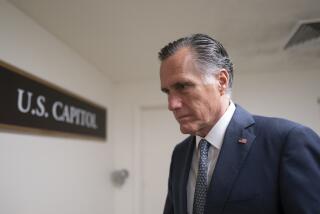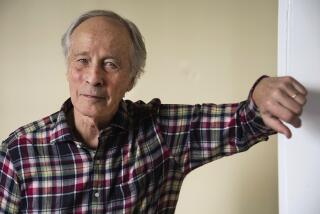‘Hard Call’ from McCain runs soft
EIGHT years ago, in a presidential campaign far, far away, Republican candidate John McCain released his first book, the rightly acclaimed early-years autobiography “Faith of My Fathers.” Written with the help of aide Mark Salter, “Faith” was a delightfully profane redemption tale of how an underachieving, hard-living Navy brat was broken, then made stronger, during his captivity in Vietnam. If there were any political considerations on display -- aside from the obvious benefit of reinforcing McCain’s heroism -- they required a microscope to detect.
Much has transpired since then, including three more McCain-Salter co-productions, and a long-simmering campaign to capture what he never did win in 2000. “Worth the Fighting For” (2002) detailed his life after Vietnam, through the lens of his maverick first run at the presidency. “Why Courage Matters” (2004) searched for the secret to bravery in a post-9/11 world; “Character Is Destiny” (2005) was an uncharacteristically pious “Profiles in Courage,” coinciding with McCain’s strategic fence-mending exercise with the religious right; and now comes “Hard Call,” another paean to the deeds of Great Men, timed exquisitely for the fall campaign season.
If history is any guide, McCain will spend the next few months gobbling up free book-tour media in venues such as “Larry King Live” and “Hardball,” talking about turning points in the careers of such leaders as Ronald Reagan, Harry Truman and Abraham Lincoln. Any resemblance to the Arizona senator’s own “hard calls” on campaign finance reform, immigration and the Iraq war will be purely intentional. Readers are wholly justified in scanning the book for contemporary politics before delving into its 20 historical profiles.
What inquiring minds want to know most in 2007 about McCain and difficult decisions of historic import is: What does he think in hindsight about going to war in Iraq over weapons that turned out to be nonexistent, and what hard call should the U.S. make in Iraq today? The few Iraq comments within, much like the rest of the book, reveal a man oddly incurious, or at least unwilling to show his hand, about the hardest presidential call of them all.
“Leave aside the question of whether we would have invaded had we known the true state of his weapons programs,” he writes. “[S]ome have argued we shouldn’t have; others, myself included, argued that Saddam [Hussein] still posed a threat that was best to address sooner rather than later.” That’s as far as the introspection goes. To McCain, what makes weapons of mass destruction interesting is not that it reopens the fateful question of war but that it led to subsequent bad decisions in the war’s aftermath; namely, wasting resources on hunting down the phantom weaponry instead of planning for force-levels “ready to deal with our success.”
If there is one consistent line in McCain’s past decade of foreign policy critiques, it’s that -- from Kosovo to Iraq -- we need many, many more boots on the ground and the courage not to flinch when they come home in body bags. “Once the decision is made, and its execution ordered, confidence should become fortitude,” he writes in the introduction to the “Confidence” section of the book (as with “Character Is Destiny,” the mini-biographies are arranged into overlapping one-word virtues such as “Awareness” and “Foresight”).
The choice of hinge moments lists heavily toward the making and preparation of war. Winston Churchill, who seems to be McCain’s go-to historical lodestar this election (replacing 2000’s Teddy Roosevelt), wins praise for building a bigger and faster navy than Germany before World War I. Theologian Reinhold Niebuhr gets an attaboy for renouncing his principled pacifism in the face of Adolf Hitler. Civil War Gen. George McClellan is pilloried for failing to rout Robert E. Lee when he had the chance, and Washington’s purveyors of “elite opinion” get zinged for mislabeling the Tet offensive as a U.S. defeat, thereby helping talk the American people out of the Vietnam War. As with Iraq, the justifications for Vietnam have never been of much expressed interest to McCain, strange given that he rotted in a Hanoi prison while his admiral father helped prosecute the war as chief of the Pacific Command. For him, the hard call in Vietnam was made by anti-war congressmen, not pro-war presidents, and the fashionable lefties got it wrong.
McCain and Salter write with an accessible if formulaic style, with endearing sprinkles of corn that work best when matter-of-factly describing dramatic events of which the reader might know little, such as a series of racial attacks against black vets returning to the Deep South after World War II. The senator has a weakness for cheek-turning martyrs, sympathetic rapscallions and quixotic over-achievers, and reading of their victories over narrow-minded skeptics is a reassuringly American exercise.
Despite the promise in the title, “Hard Call” is less concerned with dissecting the mechanics of decision-making than in celebrating the achievements of great people. The book’s premise begins to unravel already by Chapter 2, when after recounting the life story of Chicago retail giant Marshall Field, McCain suddenly remembers the title of his book and chooses as Field’s “hard call” the “course of action he followed during the traumatic events of the 1870s.” Another chapter begins with Gen. Douglas MacArthur in the Korean War and ends with Gen. Fred C. Weyand in Vietnam. These are processes, not make-or-break decisions: the literary equivalent of Senate negotiations instead of executive orders.
John McCain has long been one of the most interesting figures in public life and is possibly the only presidential candidate with two must-read books to his name. Unfortunately, the harder he runs, the further he strays from the style that made him so compelling in the first place.
Matt Welch is assistant editorial pages editor of The Times. His book, “McCain,” will be released in October.
More to Read
Sign up for our Book Club newsletter
Get the latest news, events and more from the Los Angeles Times Book Club, and help us get L.A. reading and talking.
You may occasionally receive promotional content from the Los Angeles Times.






